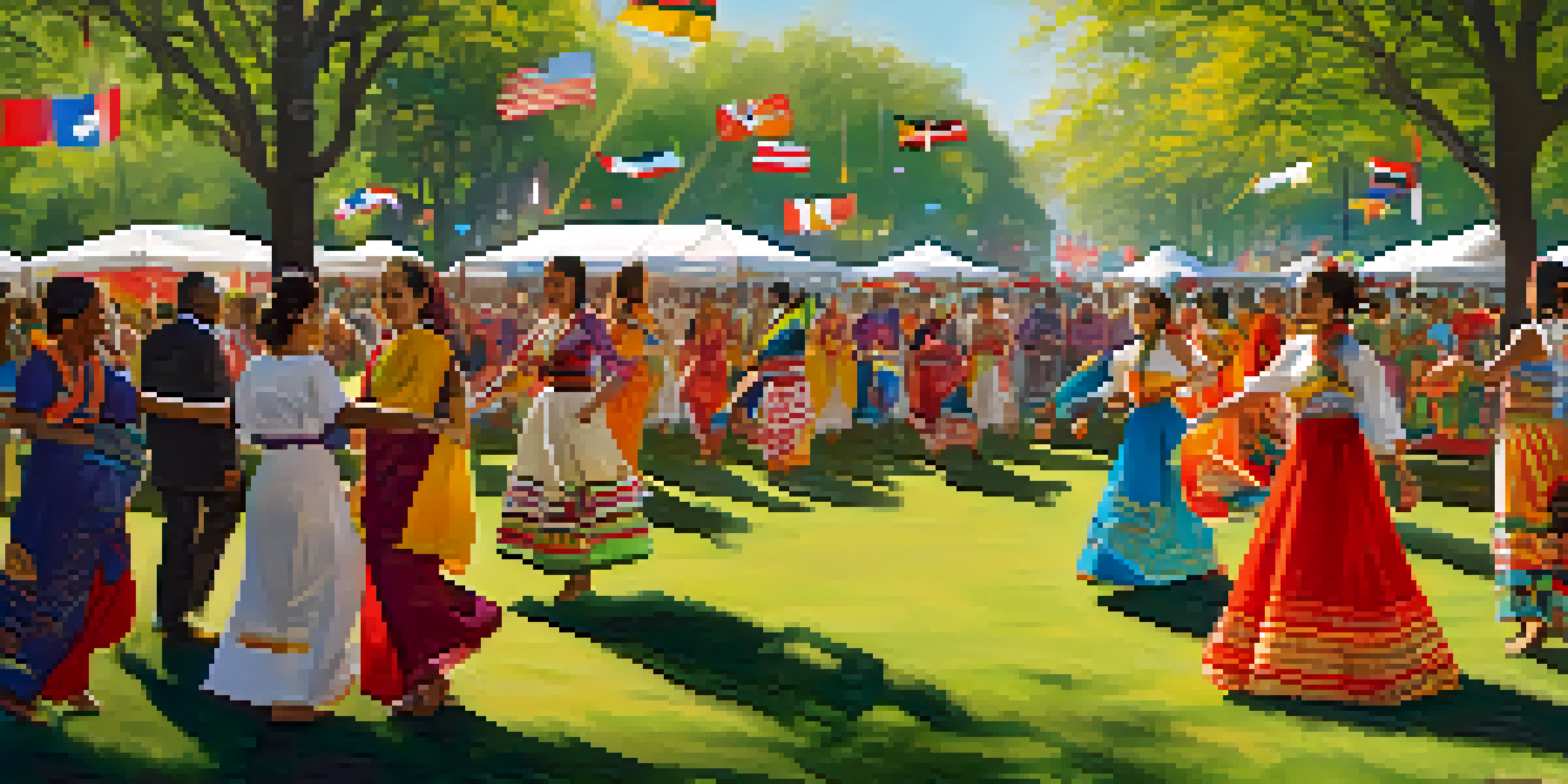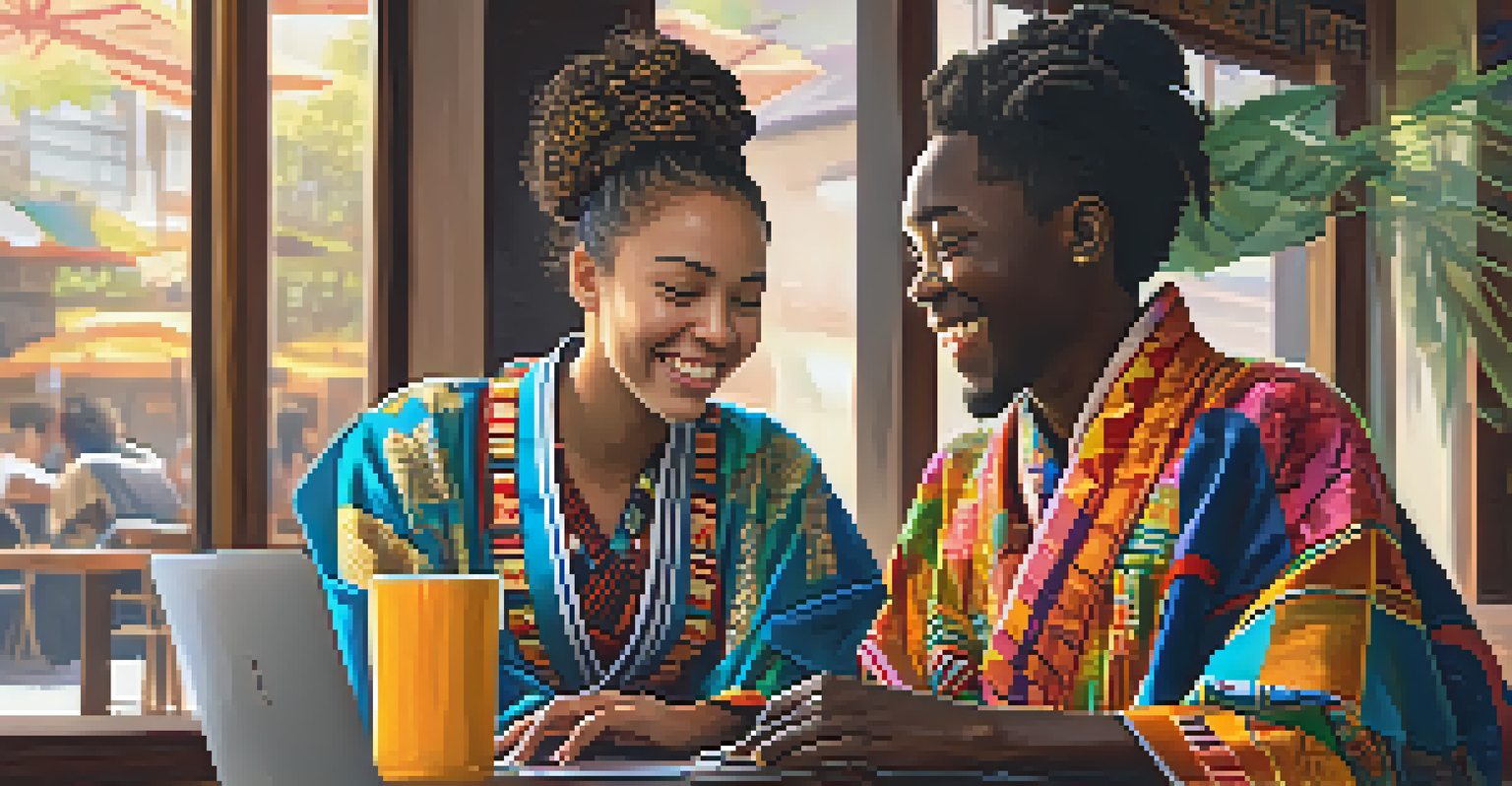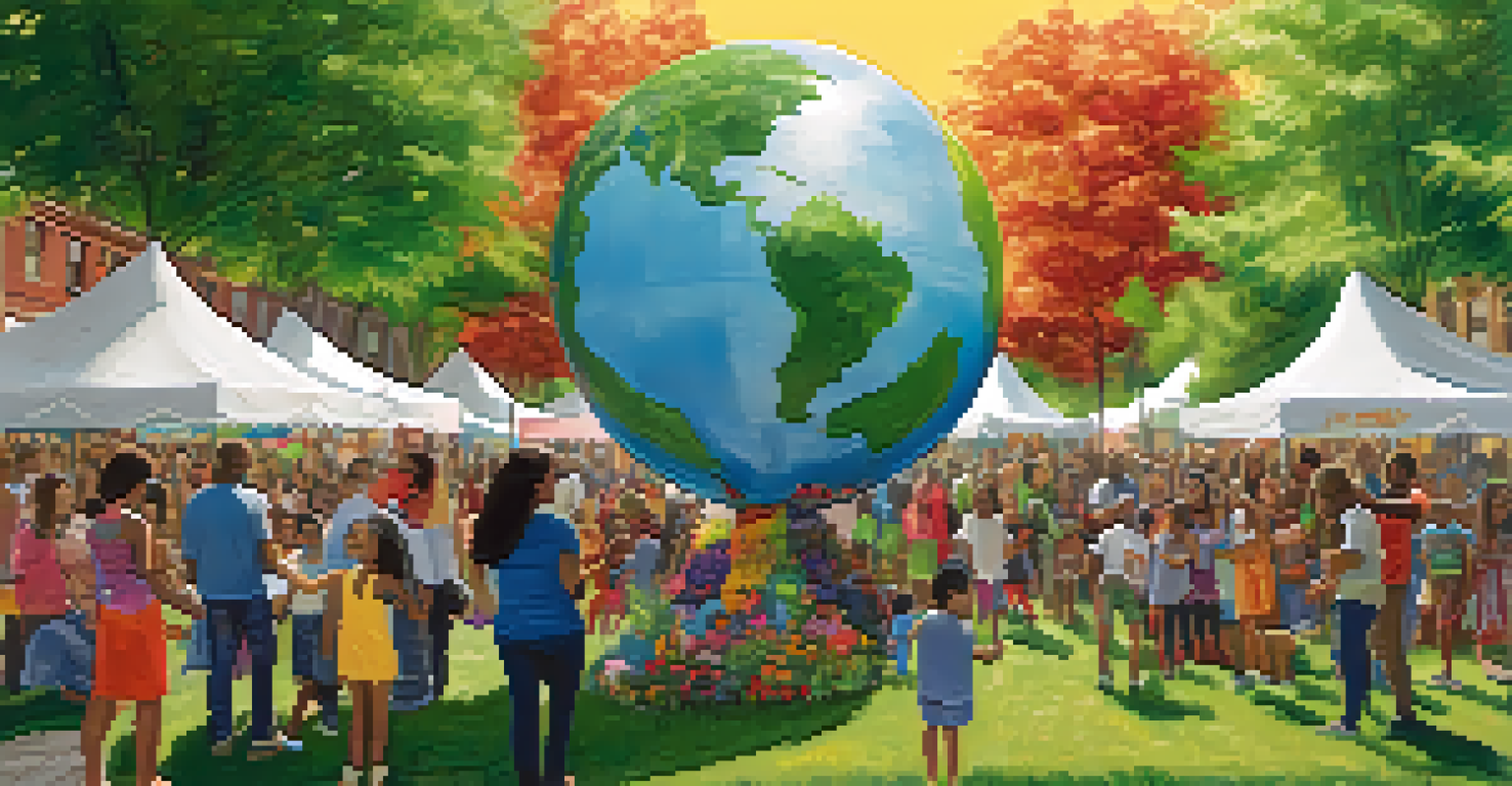How Cultural Exchange Programs Foster Global Citizenship in NYC

Understanding Cultural Exchange Programs in NYC
Cultural exchange programs are initiatives designed to promote understanding and collaboration among diverse cultures. In New York City, a melting pot of cultures, these programs provide unique opportunities for participants to immerse themselves in different traditions and perspectives. They often involve activities like language exchanges, cultural workshops, and community service, which foster meaningful connections among individuals.
The greatest gift of human beings is that we have the power of empathy.
For example, a local program might pair American students with international peers for a semester-long collaboration. Through joint projects and shared experiences, participants not only learn about each other's cultures but also develop friendships that can last a lifetime. This exchange of ideas and experiences plays a vital role in shaping one’s worldview.
Moreover, these programs often lead to greater awareness of global issues, encouraging participants to think critically about their roles as global citizens. By engaging with different cultures, they gain insights that go beyond textbooks, allowing for a richer understanding of the world around them.
Enhancing Empathy Through Cultural Immersion
One of the most significant benefits of cultural exchange programs is the enhancement of empathy among participants. By stepping into someone else's shoes—whether through shared meals, festivals, or discussions—individuals gain a deeper appreciation for diverse perspectives. This immersion helps break down stereotypes and fosters a sense of belonging among participants from different backgrounds.

For instance, a student from Brooklyn might participate in a cultural immersion trip to a community in Queens, learning about the traditions of their neighbors. Such experiences challenge preconceived notions and cultivate a spirit of compassion and understanding. This is crucial in a city as diverse as New York, where interactions among various cultures are daily occurrences.
Cultural Exchange Fosters Empathy
Cultural exchange programs enhance empathy by immersing participants in diverse perspectives, breaking down stereotypes and fostering understanding.
Ultimately, cultivating empathy leads to stronger communities. When individuals learn to appreciate the vibrancy of different cultures, they are more likely to advocate for inclusivity and social justice, reinforcing the idea that we are all part of a global family.
Building Lifelong Friendships Across Borders
Cultural exchange programs not only promote understanding but also create lasting friendships that transcend geographical boundaries. Participants often find themselves forming bonds with individuals from different cultures, leading to a network of friends around the world. These connections can open doors to future collaborations, travel opportunities, or even career paths.
Diversity is not about how we differ. Diversity is about embracing one another's uniqueness.
Consider the story of a New York teenager who befriends a student from Brazil during a summer exchange program. Over the years, they continue to communicate, sharing stories and experiences that enrich their lives. Such friendships exemplify how cultural exchanges create a sense of global community, where individuals feel connected despite being miles apart.
These relationships also foster a sense of responsibility towards each other’s cultures. Participants often feel motivated to learn more about their friends' backgrounds and advocate for cultural appreciation in their own communities, further promoting global citizenship.
Encouraging Active Participation in Global Issues
Cultural exchange programs inspire participants to become active contributors to global dialogues. With exposure to various cultural perspectives, individuals are more likely to engage in discussions about pressing global issues like climate change, poverty, and human rights. This awareness equips them with the knowledge necessary to make informed decisions and take action.
For instance, students who participate in programs focusing on environmental sustainability may return home with a newfound commitment to eco-friendly practices. They might initiate community clean-up events or advocate for policy changes, demonstrating how cultural exchange can lead to real-world impact. This active participation is a hallmark of global citizenship.
Building Global Friendships
These programs create lasting friendships across borders, leading to a sense of global community and responsibility towards cultural appreciation.
Moreover, by fostering collaboration among diverse groups, these programs encourage innovative solutions to global challenges. Different cultural perspectives can lead to creative approaches that might not have been considered in isolation, emphasizing the importance of unity in addressing worldwide issues.
Developing Language Skills and Cultural Literacy
Language is a powerful tool for connection, and cultural exchange programs often provide participants with the opportunity to learn new languages. This not only enhances communication but also deepens understanding of cultural nuances that are often lost in translation. As participants learn to express themselves in another language, they gain insights into the values and beliefs that shape different societies.
For example, a high school student in NYC might improve their Spanish skills while collaborating with peers from a Spanish-speaking country. This experience not only boosts their confidence but also allows them to engage more meaningfully with the culture. Language becomes a bridge, connecting individuals and fostering richer interactions.
Furthermore, developing language skills contributes to cultural literacy—an awareness of and appreciation for different cultural contexts. This literacy is essential for navigating an increasingly interconnected world, where effective communication across cultures is vital.
Empowering Youth to Become Global Leaders
Cultural exchange programs play a pivotal role in shaping the next generation of global leaders. By equipping young individuals with the skills and knowledge needed to navigate a multicultural world, these programs empower them to take on leadership roles in their communities and beyond. Participants learn to appreciate diversity and champion inclusivity, essential traits for effective leadership.
Consider a young woman from NYC who, after participating in a cultural exchange, returns with a passion for social justice. Inspired by her experiences, she might start initiatives that promote cultural awareness in her school. This kind of leadership is crucial in fostering a more equitable society, where diverse voices are heard and valued.
Empowering Future Leaders
Cultural exchange equips youth with the skills to become global leaders, promoting inclusivity and social justice in their communities.
Moreover, as these young leaders connect with peers from around the globe, they build networks that can amplify their impact. Together, they can tackle global challenges, share resources, and collaborate on solutions, reinforcing the idea that leadership is not about authority but about making a difference in the world.
Creating a More Tolerant and Inclusive Society
At the heart of cultural exchange programs is the goal of fostering tolerance and inclusivity within communities. By encouraging individuals to explore and embrace diverse cultures, these programs help break down barriers and promote understanding. This is especially important in a diverse city like New York, where social cohesion is vital for harmony.
When participants engage with people from different backgrounds, they often discover commonalities that transcend cultural differences. This shared human experience fosters a sense of belonging and reduces prejudice, creating a more inclusive environment. For instance, a community event that celebrates various cultures can unite residents and cultivate a spirit of acceptance.

Ultimately, a more tolerant society is a stronger society. By nurturing empathy, understanding, and respect through cultural exchange programs, we can work towards a future where diversity is celebrated, and everyone feels valued.
Conclusion: The Lasting Impact of Cultural Exchange
In conclusion, cultural exchange programs in NYC serve as powerful catalysts for fostering global citizenship. They create opportunities for individuals to connect, empathize, and engage with diverse cultures, leading to a more inclusive and understanding society. The friendships formed and the lessons learned through these programs have a lasting impact on participants, shaping their identities as global citizens.
As we continue to navigate an increasingly interconnected world, the importance of cultural exchange cannot be overstated. By investing in these programs, we not only enrich the lives of participants but also contribute to the creation of a more harmonious global community. Each exchange is a step towards building bridges and dismantling walls.
By embracing the values of empathy, understanding, and collaboration, we can create a brighter future for all. Let us celebrate the power of cultural exchange and its role in shaping a generation of compassionate and informed global citizens.